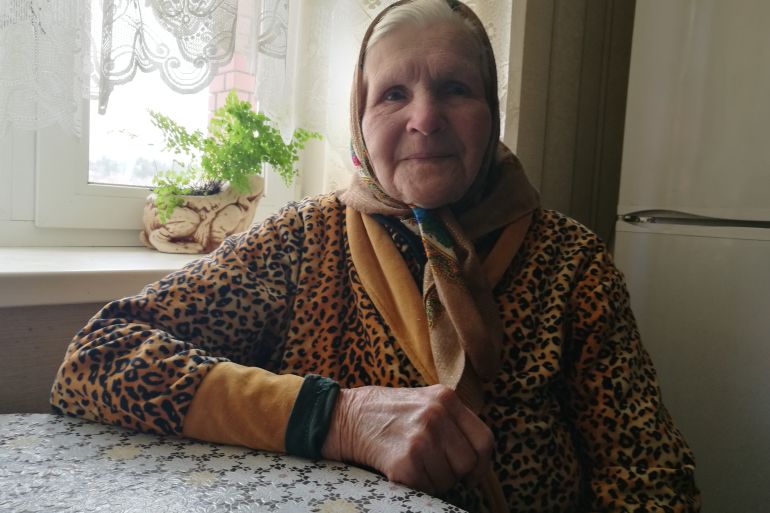‘I wept for days’: Ukrainian woman, 90, relives painful memories
Retired nurse Nadia Tyvoniuk says Russia’s war represents the second time Moscow has invaded Ukraine in her lifetime.

Kyiv, Ukraine – For 90-year-old Nadia Tyvoniuk, the current war in her country represents the second Russian invasion she has witnessed in her long life.
On February 24, when Russian President Vladimir Putin ordered his troops into Ukraine after months of heightened tensions, “I wept for three days, my relatives had to calm me down”, Tyvoniuk told Al Jazeera from the kitchen of her son’s home, on the outskirts of the capital, Kyiv.
Keep reading
list of 4 itemsFinland mulls joining NATO after Russia’s war in Ukraine
Will Ukraine change how Europe treats future refugees?
What do we know about Ukraine’s use of Turkish Bayraktar drones?
A retired nurse, Tyvoniuk was born in 1931 in a village in the Volyn region in what is now post-Soviet Ukraine.
At the time, however, western Volyn was part of Poland – and Tyvoniuk holds no grudges against Warsaw’s policies there – even though for subsequent decades under the USSR, she would hear about the forced “Polonization” and the suppression of Ukrainian culture under Warsaw.
“Poland was a different kind of occupant. They liked hard-working people, didn’t like lazybones,” Tyvoniuk said.
And Tyvoniuk’s parents were hard-working. They had horses, cows, chickens and a land lot of 5,000 square metres (1.2 acres).
“And then the Russians came and ruined everything,” she said.
By “Russia” she meant the USSR, whose leader Josef Stalin made a deal with his Nazi German counterpart Adolf Hitler in 1939 to partition Poland.
Communist Moscow occupied what is now western Ukraine, and immediately started purging political activists and intellectuals.
Tyvoniuk’s village, Rivne, was so close to the new Soviet-Polish border that she recalled hearing “geese from the other side”.
Moscow, however, banned contact with the other side, and Tyvoniuk, whose grandmother was ethnic Polish, has since lost touch with her relatives in Poland.
In 1941, Nazi Germany invaded the USSR catching Stalin by surprise. Ukraine became the focal point of hostilities losing a fifth of its civilian population – and most of its Jews.
Tyvoniuk’s father was imprisoned in a German concentration camp but he escaped and returned to his village to join the Red Army.
In 1943, Ukrainian nationalist forces that collaborated with Nazi Germany initiated the “Volyn massacre” of tens of thousands of ethnic Poles.
The massacre still causes tensions between Kyiv and Warsaw as Ukraine lionises the Ukrainian nationalists who instigated the massacre – and occasionally helped Nazis kill Ukrainian Jews.
After World War II ended in 1945, Moscow began a collectivisation campaign in its newly-acquired Ukrainian regions.
The Tyvoniuks had their horses, most of their land and a barn “collectivised”, and Nadia remembers her excruciating work on collective farmland for which she was paid in meagre amounts of grain.
“The forest kept us alive,” she said describing how they collected mushrooms and berries and used a grindstone to turn dried blueberries into flour.
She became a nurse and worked for 43 years in the western Ukrainian city of Lutsk before retiring and moving in with her children.
Tyvoniuk now voraciously watches television news – and is adamant that Ukraine will triumph in repelling the second Russian invasion in her memory.
“Then we will drink champagne,” she said.